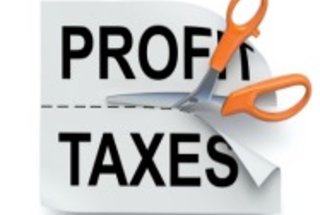 The main rate of Corporation Tax should be cut to 20% in the next Budget, writes David Martin in How to cut Corporation Tax, published on Wednesday 1 February by the Centre for Policy Studies.
The main rate of Corporation Tax should be cut to 20% in the next Budget, writes David Martin in How to cut Corporation Tax, published on Wednesday 1 February by the Centre for Policy Studies.
David Martin, a leading tax lawyer, shows that the main rate of Corporation Tax has gradually been falling in the UK, from 52% in 1982 to 26% today. This halving of the rate of Corporation Tax has been accompanied by an increase in the revenue it has generated for the Treasury. In 1982-83, it yielded revenues equivalent to 2.0% of GDP. In this financial year, the Treasury expects Corporation Tax to yield 2.8% of GDP (or £43.2 billion).

A further substantial and immediate cut in Corporation Tax now – to 20% – could do much to boost growth and international competitiveness (until 2005, UK rates of Corporation Tax were lower than the OECD average). It would boost business confidence, encourage new investment by businesses (as it would improve net returns) and would send a strong signal that the Coalition is taking the supply-side measures necessary to restore growth. It would also represent a major simplification of the tax system.
The recent evidence suggests that this should not necessarily lead to a fall in Treasury revenues. However, given the weak state of the public finances, the static costs of a cut to 20% should be noted. Depending on the approach used, this might involve a loss of revenue to the Treasury of between £4 billion (according to the Treasury ready reckoner) and £8.5 billion (on a straight line basis).
This theoretical fall in revenue could easily be matched by, for example, abolition of higher rate tax relief on pensions.
This cut in the rate of Corporation Tax would also afford a great opportunity to announce a programme of tax simplification.
A deeper cut may be desirable in due course. This would, however, require detailed planning to reduce opportunities for tax avoidance. This could probably best be done by introducing a “Further Corporation Tax” so that when dividends were paid by a company, the effective tax rate would remain at 20%. Business owners would then have a further significant incentive to reinvest profits, thereby creating a virtuous cycle of higher investment and higher profits.
Tim Knox, Director of the Centre for Policy Studies, comments:
“Anyone who has complained recently about ‘high rewards for failure’ should be equally vehement about high penalties for success. They should therefore back these plans to reduce Corporation Tax. For this tax penalises the most successful businesses in Britain. And as profitable businesses are the only source of a viable economic recovery, the Chancellor should reduce the rate of Corporation Tax in the 2012 Budget – and also announce his intention to reduce it even further to 15% or even 10% once the appropriate anti-evasion measures are in place.”
Media Impact
“The Centre for Policy Studies is urging David Cameron to cut corporation tax to as little as 10 per cent because it is the “only source of a viable economic recovery”.
In last year’s Budget, George Osborne, the Chancellor, pledged to cut the main rate of corporation tax to 23 per cent from the current 26 per cent by 2014, the lowest rate in the G7 group of leading economies. A report by the think tank, however, argues that the Government needs to take a more drastic approach, reducing it to 20 per cent in this year’s Budget.”
“SLASHING the rate of corporation tax will stimulate the economy and make the UK a more attractive destination for businesses relative to other advanced economies, a report from the Centre for Policy Studies (CPS) argues today.
The government currently plans to cut the rate of corporation tax by one percentage point per year, taking it from the current standard rate of 26 per cent to 23 per cent by 2014. The rate stood at 52 per cent in 1982.”
“The question is, how would the rest of the UK respond to this? Corporate tax rates of between 10 and 15 per cent are fairly common among smaller European nations. Not so the big guns. It is a well-known fact about certain forms of tax that if you cut them you generate more revenue. The Centre for Policy Studies argues that this is particularly true of corporation tax, which has halved from 52 per cent in 1982 to its current level of 26 per cent, and falling, in the UK. This has had a striking effect on revenues, which have increased from 2 per cent of GDP to 2.8 per cent (equating to the not-inconsiderable sum of £43.2bn).
Proponents of cuts to corporation tax say it not only attracts more businesses from overseas and encourages new ones to set up here, it also boosts confidence and provides businesses with more revenue for investment, and crucially, job creation. Which means even more profits and more revenues for the taxman.